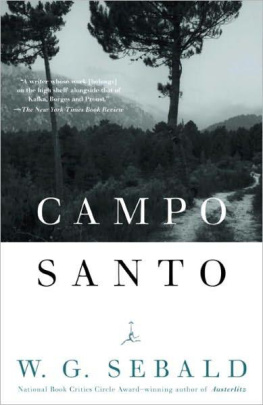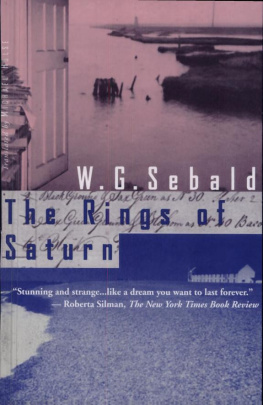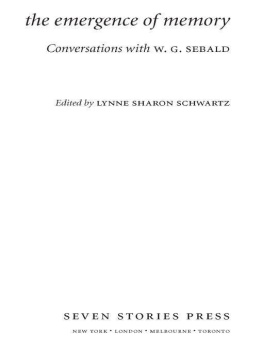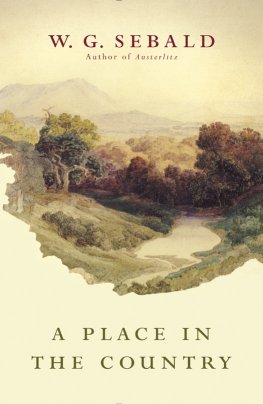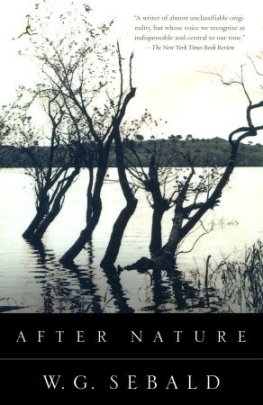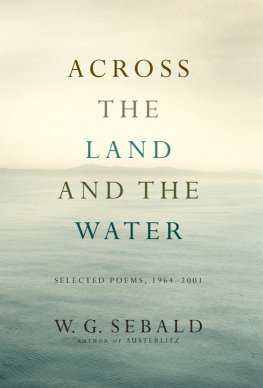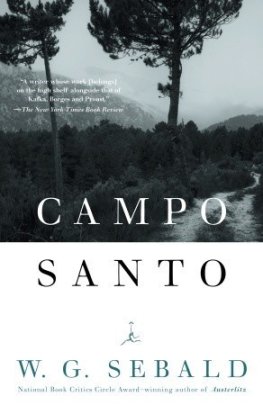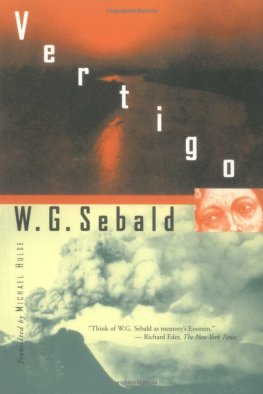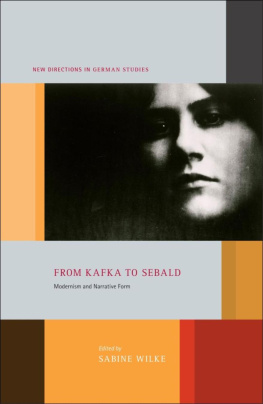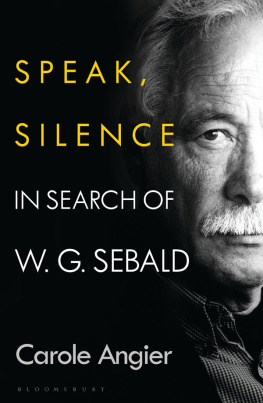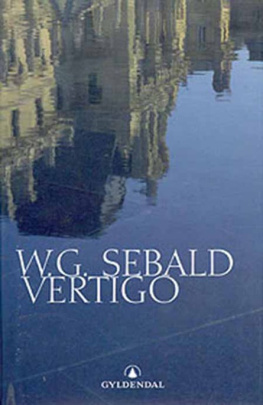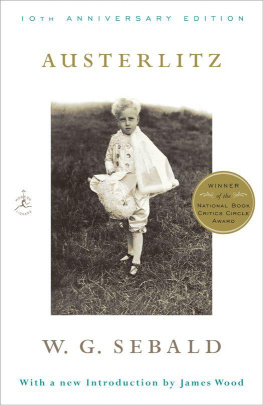Praise for Campo Santo
Brilliant bursting with flavors at once precise and luscious [ Campo Santo ] reminds us what a significant loss [Sebalds] early passing was to the literary world. [The] travel essays on Corsica are absolute gems. [D]iscussions of Nabokov, Kafka, Gnter Grass, and the schizophrenic poet Herbeck provide a satisfaction as rare as a perfect meal.
The Boston Globe
[A] darkly companionable voice This magnificent writer may have left abruptly, but his own shadow lingers.
The New York Times Book Review
Max Sebald has begun to be widely recognized as one of the most important prose writers of the past 20 years.
The Economist
Nuanced multidimensional Ruminative and elegiac, the late W. G. Sebald wove threads of timelessness connecting past and present.
The Dallas Morning News
All of Sebalds books are about journeys [and he] is an entertaining guide.
The New York Review of Books
Sebald exemplified the best kind of cosmopolitan literary intelligencehumane, digressive, deeply erudite, unassuming and tinged with melancholy. His themes are marked by the seriousness of middle age. Yet Sebalds spirit remains that of a philosophical gypsy.
The Washington Post Book World
[Sebald] is prone to visions, hallucinations, and premonitions, usually induced by a confrontation with a personal memory or a historical site. These are the source of the subdued horror of much of Sebalds work, and also of its very dry humor. Four fragments of a literary work about a trip to Corsica have the virtues of Sebalds best work, with its odd blend of fiction, memoir, history, and travelogue.
The New York Sun
Stunning intensely observant, erudite, lyrical, and provocative Detailed descriptions of Sebalds wanderings on [Corsica] turn into musings of astonishing beauty and insight into history, environmental decimation, and our feelings about death. These arresting meditations, brilliant syntheses of thought and feeling, are followed by masterful, passionate critical essays expressing Sebalds belief in the healing power of literature and our obligation to remember the past and respect life in all its wonders and mysteries
Booklist
[A] masterful translation Sebald was a beautiful and intelligent writer.
Publishers Weekly
If you thought literary modernism was dead, guess again. The spirit of such masters as Kafka and Borges lives on in the [work] of W. G. Sebald.
The Wall Street Journal
2006 Modern Library Trade Paperback Edition
Translation copyright 2005 by Anthea Bell
All rights reserved.
Published in the United States by Modern Library, an imprint of The Random House Publishing Group, a division of Random House, Inc., New York.
M ODERN L IBRARY and the T ORCHBEARER Design are registered trademarks of Random House, Inc.
This edition was published in hardcover in the United States by Random House, an imprint of The Random House Publishing Group, a division of Random House, Inc., in 2005.
Published in the United Kingdom by Hamish Hamilton, a publishing division of Penguin Books Ltd., in 2005.
This work was originally published in German by Carl Hanser Verlag, Mnchen, in 2003. Copyright 2003 by The Estate of W. G. Sebald. Copyright 2003 Carl Hanser Mnchen Wien. This English language translation by Anthea Bell is published here by arrangement with Hamish Hamilton, a publishing division of Penguin Books Ltd.
LIBRARY OF CONGRESS CATALOGING-IN-PUBLICATION DATA
Sebald, Winfried Georg
[Campo Santo. English]
Campo Santo/W. G. Sebald;
translated by Anthea Bell.1st ed.
p. cm.
eISBN: 978-0-307-43303-9
I. Bell, Anthea. II. Title.
PT2681.E18C36 2005
834.914 dc22 2004050311
www.modernlibrary.com
v3.1
CONTENTS
EDITORIAL NOTE
Campo Santo is a collection of prose by W. G. Sebald, who died in a road accident on December 14, 2001. His novel Austerlitz had been published shortly before, and Sebald had not yet begun working on a new book since finishing it. However, there was a work that was never finished: in the middle of the 1990s, after the publication of The Rings of Saturn (1995), Sebald began writing a book about Corsica, but then set it aside and turned to writing essays and working on Austerlitz . Parts of this Corsica project were published from 1996 onward as separate texts, in various places; Sebald also used a long section in 2000 as a text for his acceptance speech on the occasion of the award of the Dsseldorf Heine Prize. These texts are collected together for the first time and arranged, in the order of their composition, in the opening section of the present volume: A Little Excursion to Ajaccio (In September last year, during a two-week holiday on the island of Corsica), Campo Santo (My first walk the day after my arrival in Piana), The Alps in the Sea (Once upon a time Corsica was entirely covered by forest), and finally the miniature La cour de lancienne cole. Together, the four Corsican texts, each self-contained, make up admittedly only an incomplete spectrum, which cannot show exactly what the abandoned book would have been like; however, collecting the separate parts makes them appear in a new light, and they also cast light on each other. Sebalds literary estate, which has not yet been studied and edited, contains no other recent literary works. The Corsican project is the last and unfinished work of a writers life that came to a premature end.
The second part of this volume illustrates Sebalds other side, as essayist and critic. Two collections of essays on Austrian literature, Die Beschreibung des Unglcks (1985) and Unheimiche Heimat (1991), have already been published in German. In addition, there are the later volumes Logis in einem Landhaus (1998) and Luftkrieg und Literatur (1999), including an essay on Alfred Andersch that has provoked much controversy. The development shown in these volumes is also reflected in the essays in the present collection, which are chronologically arranged. They have previously appeared in scholarly journals, literary magazines, and the arts sections of newspapers, but are now published in book form for the first time. There are early works of literary criticismthe first, on Peter Handkes play Kaspar , dates from 1975which already show Sebalds concern with such subjects as destruction, mourning, and memory, themes around which his literary work would continue to revolve, and they show the development of his stylistic individuality. The later essayson Ernst Herbeck, Vladimir Nabokov, Franz Kafka, Jan Peter Tripp, and Bruce Chatwinwritten from the early 1990s on, at the same time as the narratives Vertigo, The Emigrants, The Rings of Saturn , and Austerlitz , finally dispense with footnotes, throw the ballast of scholarly references overboard and instead strike the typically Sebaldian note. In Moments musicaux and An Attempt at Restitution, Sebalds speeches at the opening of the Munich Opera Festival and the Stuttgart House of Literature in the year of his death, the essayist can no longer be distinguished from the writer. In his final works Sebald practiced the principle to which he had confessed in an interview with Sigrid Lffler in 1993: My medium is prose, not the novel. At the end of the volume is Sebalds speech accepting membership in the German Academy for Language and Literature. Here he tells us of a dream in which he, like Johann Peter Hebel before him, is unmasked as a traitor to his country and a fraudin view of such fears, he says, he regards admission to the Academy as an unhoped-for form of justification. Another, perhaps less unanticipated and certainly no less honorable form of justification is the wide acceptance of Sebalds books by the general reader and the serious discussion of his ideas.
Sven Meyer
Published in English as On the Natural History of Destruction , and also including the essays on Jean Amry and Peter Weiss, which in the original German are part of the present volume published by Hanser.
Next page
